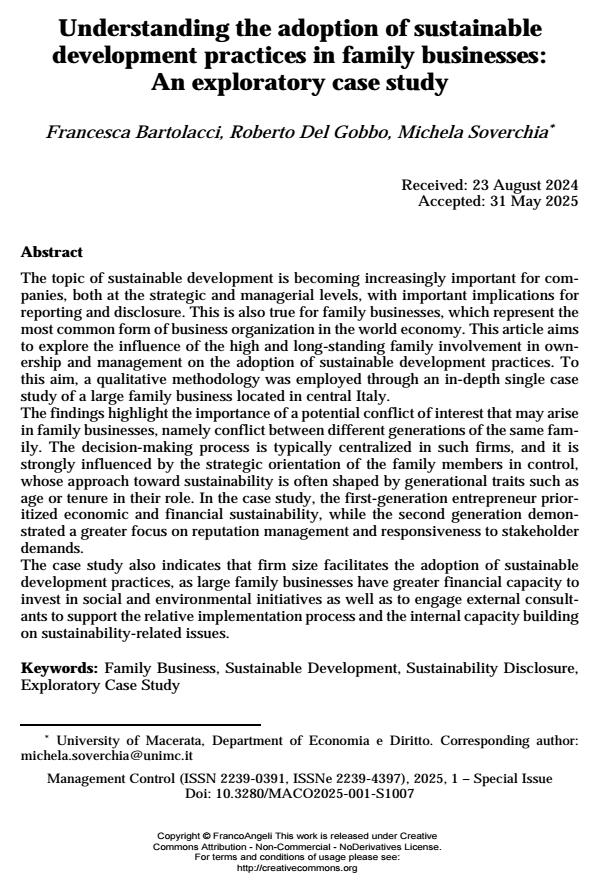Understanding the adoption of sustainable development practices in family businesses: An exploratory case study
Titolo Rivista MANAGEMENT CONTROL
Autori/Curatori Francesca Bartolacci, Roberto Del Gobbo, Michela Soverchia
Anno di pubblicazione 2025 Fascicolo 2025/1 Suppl.
Lingua Inglese Numero pagine 18 P. 147-164 Dimensione file 114 KB
DOI 10.3280/MACO2025-001-S1007
Il DOI è il codice a barre della proprietà intellettuale: per saperne di più
clicca qui

FrancoAngeli è membro della Publishers International Linking Association, Inc (PILA), associazione indipendente e non profit per facilitare (attraverso i servizi tecnologici implementati da CrossRef.org) l’accesso degli studiosi ai contenuti digitali nelle pubblicazioni professionali e scientifiche.
The topic of sustainable development is becoming increasingly important for companies, both at the strategic and managerial levels, with important implications for reporting and disclosure. This is also true for family businesses, which represent the most common form of business organization in the world economy. This article aims to explore the influence of the high and long-standing family involvement in ownership and management on the adoption of sustainable development practices. To this aim, a qualitative methodology was employed through an in-depth single case study of a large family business located in central Italy. The findings highlight the importance of a potential conflict of interest that may arise in family businesses, namely conflict between different generations of the same family. The decision-making process is typically centralized in such firms, and it is strongly influenced by the strategic orientation of the family members in control, whose approach toward sustainability is often shaped by generational traits such as age or tenure in their role. In the case study, the first-generation entrepreneur prioritized economic and financial sustainability, while the second generation demonstrated a greater focus on reputation management and responsiveness to stakeholder demands. The case study also indicates that firm size facilitates the adoption of sustainable development practices, as large family businesses have greater financial capacity to invest in social and environmental initiatives as well as to engage external consultants to support the relative implementation process and the internal capacity building on sustainability-related issues.
Parole chiave:Family Business, Sustainable Development, Sustainability Disclosure, Exploratory Case Study
Francesca Bartolacci, Roberto Del Gobbo, Michela Soverchia, Understanding the adoption of sustainable development practices in family businesses: An exploratory case study in "MANAGEMENT CONTROL" 1 Suppl./2025, pp 147-164, DOI: 10.3280/MACO2025-001-S1007